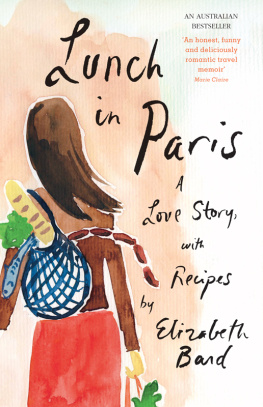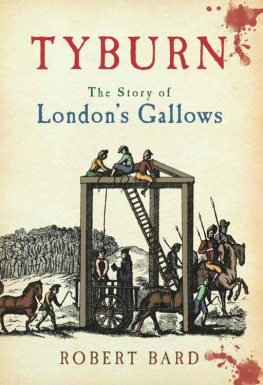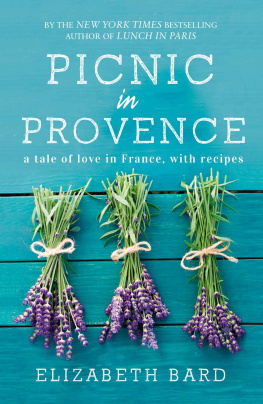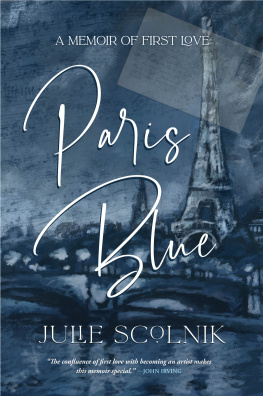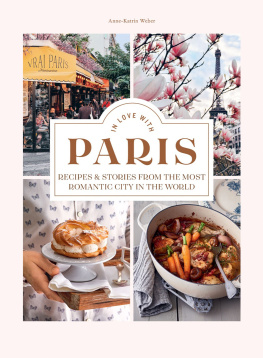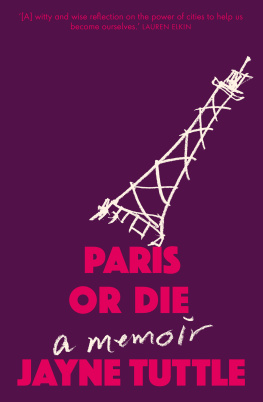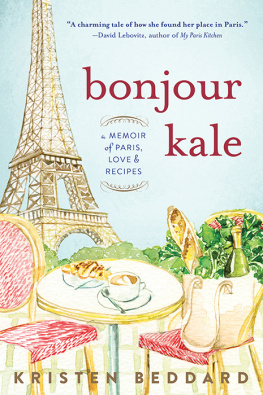Certain names have been changed to protect peoples privacy (poor Gwendal, he didnt get that lucky).
COFFEE, TEA, OR ME
I slept with my French husband halfway through our first date. I say halfway because we had finished lunch but not yet ordered coffee. It turned out to be a decisive moment, more important for my future happiness than where I went to college or years with a good shrink. The question was posed lightly: It looked like rain. We could sit it out in a caf or, since his apartment was not far, he could make tea.
I was not fully aware at the time that American girls in Paris are sluts by definition, willing to do sober what British girls will only do drunk. It seemed like a simple choice; I like tea.
Mind you, I am not that girl. (Or at least, I wasnt.) Im not the girl who swings from the chandeliers and screws men because she can, fixing her lipstick in the rearview mirror of a cab hailed at dawn. Im the girl you call Wednesday for Saturday. The girl who reads Milton for fun and knows a fish fork when she sees one. A flirt maybe, but in that harmless, nineteenth-century, kiss-my-hand-and-ask-me-to-waltz kind of way. Mostly, Im a thinker, a worrier. Since Im also a New Yorker, you can take that last bit up a notch. Its not that theres no free spirit in me. But its a free spirit with a five-year plan.
As the waiter added up our bill with a ballpoint pen on the paper tablecloth, I took another look at the handsome stranger sitting across from me. Gwendal. Gwen-DAL. Had I been pronouncing his name with the emphasis on the wrong syllable all afternoon? Oh well.
He was tall, with thick dark hair that just touched his collar. A wayward strand stuck straight up on the top of his head; it had probably been that way since he was five. His turtleneck sweater was the color of warm milk. On the empty chair beside him was a stiff navy blue cap, the kind worn by boys selling newspapers on the snowy streets of Chicago in 1932. He had strangely perfect teeth for a European, and though it was only one in the afternoon, I could already see the rising shadow of his beard. I was trying not to stare, but his hazel-green eyes seemed to be exactly the same color as my own.
Like any first date, I knew only a few tantalizing details. The strange name came from Brittany, on the Channel coast of France. His family was in Saint-Malo, a provincial port city hed fled as soon as possible. He spoke passable English, much better than my leftover college French, but with an Australian accent something he picked up during his year of military service at the French embassy in Canberra. He seemed shy and serious, but broke easily into a wide grin mostly when I said something was fascinating .
We had met in late September, at an academic conference in London called Digital Resources in the Humanities. (Can you think of a less promising place to meet the love of your life?) He was finishing up a PhD in Computer Science; I was starting a masters in Art History. When I spotted him in a seminar on a hypertext version of Finnegans Wake, I knew he had to be European. The Americans were too fresh-faced, the English so pale and rumpled. I suppose he could have been German, on account of his height (and the hideous light blue windbreaker he was wearing), but something about the dark hair, the square jaw, and the little glasses said caf crme .
On the last day of the conference, I ran into him on the stairs. We Americans have that wonderful puppy-dog way of going up to complete strangers with a big smile and a dumb question. I rarely fight it in so many situations, its a gift. I asked him what his research was about. He took it from there.
Artfully worded e-mails flew back and forth. I even tried writing one in French, begging Gwendal in advance to correct my grammar. He waited several months to tell me that corrigez-moi doesnt imply check my spelling so much as tie me up and tickle me with a feather duster. There should really be a footnote in those high school textbooks.
By December, Id invented a reason to come to Paris, something about temporary exhibitions.
And now we were here, having lunch.
Gwendal had been strategic in his choice of restaurant. The Bouillon Chartier is a brusque canteen in the 9th arrondissement. To an American, this was movie-set Paris. Tucked into a narrow arcade between a Chinese restaurant and a ptisserie, Chartier has been open since 1896, and served the same purpose then as now filling up the masses before a stroll down the see-and-be-seen Grands Boulevards.
The room was vast, noisy, and completely full. Gwendals glasses fogged up as he pushed ahead of me through the heavy revolving door. The walls were the color of new butter, and the light from the globes of ten enormous chandeliers was much brighter than the pale gray Paris afternoon we left outside. There must have been two hundred people, all with knives and forks poised somewhere between their mouths and their neighbors nose (emphasizing a point, I imagine). Groups of tables were separated by dark wooden partitions, like the waiting room of a train station, and above the heads of the diners were gleaming brass hat rails heaped with folded coats, shopping bags, and dangling scarves.
The waiters certainly looked like they had a train to catch. Dressed in white shirts and black vests, they wove in and out of traffic, often holding a dozen escargots , a boeuf bourguignon , and a baba au rhum in the crook of a single thumb. There were tiny numbered cubbies along the walls, where regular clients once stored their linen napkins. The tables were small enough that if you put your elbows on the edge youd have a hard time not holding hands with the person across the way.
Though Id never been in this room before, something about it felt wonderfully familiar. Europe had that effect on me, ever since I stepped off the plane for the first time in college. I felt more like myself here: as though my love of art and history was natural and my inability to name the latest rock band didnt matter. In Paris the past is always with you: you look at it, walk over it, sit on it. I had to stop myself from grabbing Gwendals arm as we walked up the narrow passage to the entrance: Pardon me, sir, I couldnt help but notice; the cobblestones outside your door are older than my country. The idea thrilled me. Ive always been a bit of an old-fashioned girl. I feel good in old places.
As we waited for one of the turbocharged waiters to take our order, I prodded Gwendal about his PhD research. From the little he had explained to me when we met, it was something about how to archive film and video on the Internet. In fact, he was already working full-time for Frances National Radio and Television Archives while he finished his degree.
Archiving is a question of collective memory, he said, toying with a slice of baguette from the basket on the table. When you decide, as a culture, what you want to keep, you also have to decide what you are willing to forget.

